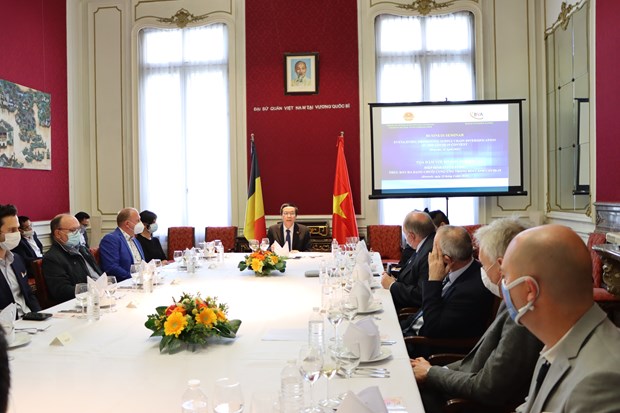 Economy
Economy


|
| At the talk held in Brussels on Thursday. — VNA/VNS Photo |
BRUSSELS — Belgian enterprises expressed their interest in Việt Nam’s economic prospects and business opportunities in the Southeast Asian country at a talk held in Brussels on Thursday.
At the event, held by the Vietnamese Embassy in Belgium and Luxembourg, the Vietnamese delegation to the EU, the Flanders Investment and Trade (FIT), and the Belgian – Vietnamese Alliance (BVA), the firms highlighted advantages and challenges brought about by the EU-Việt Nam Free Trade Agreement (EVFTA) and several trade deals Việt Nam has clinched.
They also talked about Việt Nam’s efforts to improve its business climate, incentives for Belgian firms to invest in Việt Nam, as well as Việt Nam’s entry procedures for Belgian experts and businesspeople during COVID-19.
Vietnamese Ambassador Vũ Anh Quang updated participants on the outcomes of the 13th National Party Congress, implementation of the EVFTA, and Việt Nam-Belgium trade ties.
He called on Belgian businesses to help push for the ratification of the EU-Việt Nam Investment Protection Agreement (EVIPA) in their country, which would aid companies of both nations.
According to Dương Minh Trí, a representative from the BVA, an increasing number of Belgian firms wish to invest in Việt Nam, particularly since the EVFTA came into force.
Charles Vanderstraeten from DSV Solutions, which has already set up a branch in Việt Nam, told the Vietnam News Agency’s correspondent that the trade pact facilitates Belgian firms’ operation in Việt Nam, adding his business will have more opportunities to develop in this Southeast Asian nation.
Eric Franssen, trade and development director at John Cockerill, said his firm is carrying out several energy and environment projects in Việt Nam, and the company has had more opportunities to develop its business thanks to the EVFTA.
Belgian firms have invested US$1.1 billion in 78 projects in Việt Nam, making the nation the 23rd largest investor among 131 countries and territories investing in the nation. Most of the investments are in seaports, infrastructure, logistics, real estate, sewage treatment, processing and manufacturing, and power generation and distribution, among others. — VNS




